Are All MC4 Extension Cables Universally Compatible?
Many installers assume every MC4 cable fits all solar panels. But that’s a costly mistake that can cause loose connections or even fire hazards.
Not all MC4 extension cables fit every solar panel. Compatibility depends on the connector brand, tolerance, certification, and locking design used by the panel manufacturer.
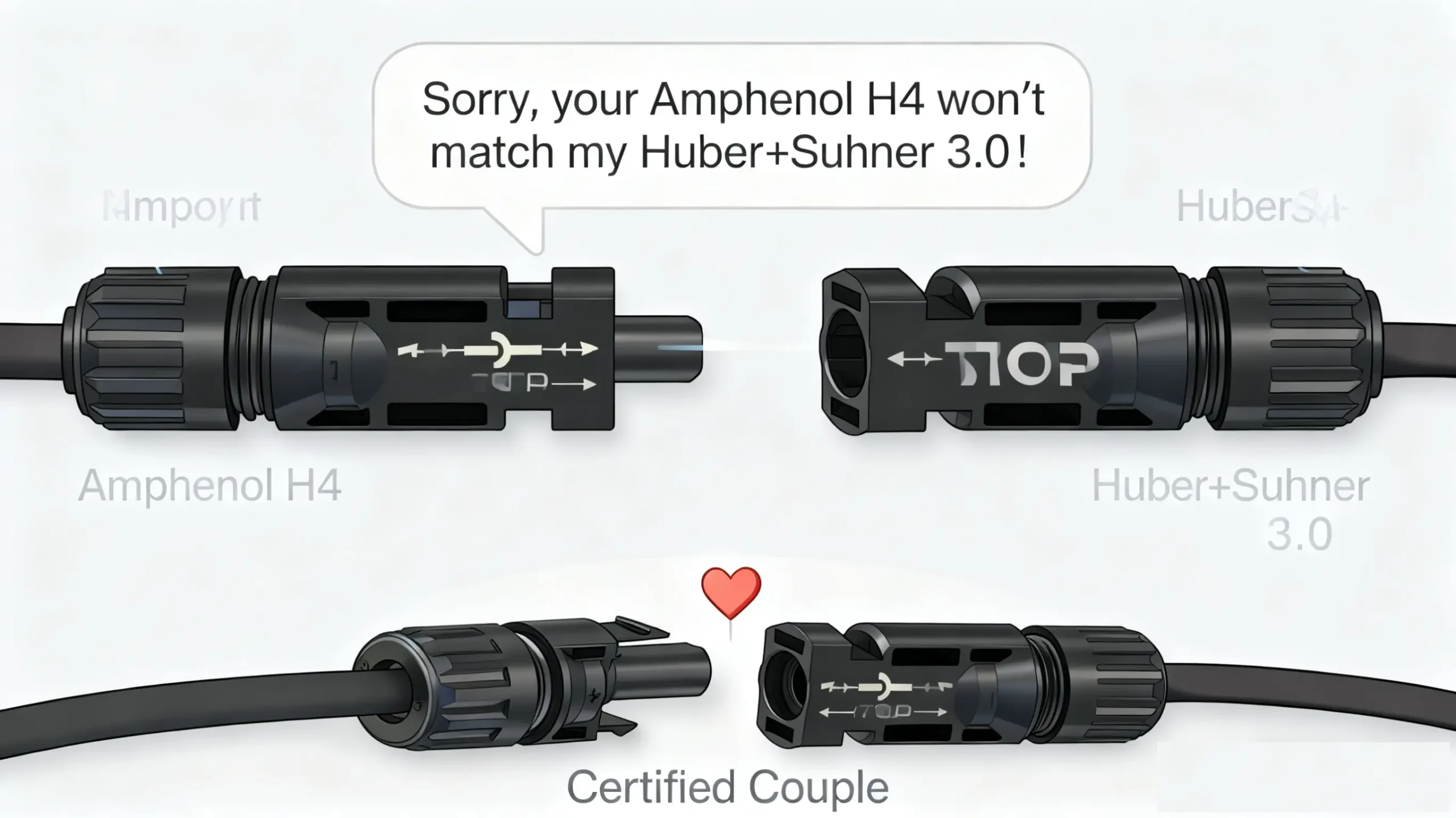
The truth is — while MC4 connectors look identical, tiny internal differences make some combinations unsafe or non-compliant. Let’s uncover what to check before you connect.
Are MC4 Extension Cables Compatible with All Solar Panel Brands?
It’s easy to think that “MC4” means universal. But different solar panel brands use connectors with slightly different mechanical tolerances.
MC4 extension cables1 are compatible only if both the cable and the panel use genuine, TÜV-certified MC4 connectors2 from the same specification standard.
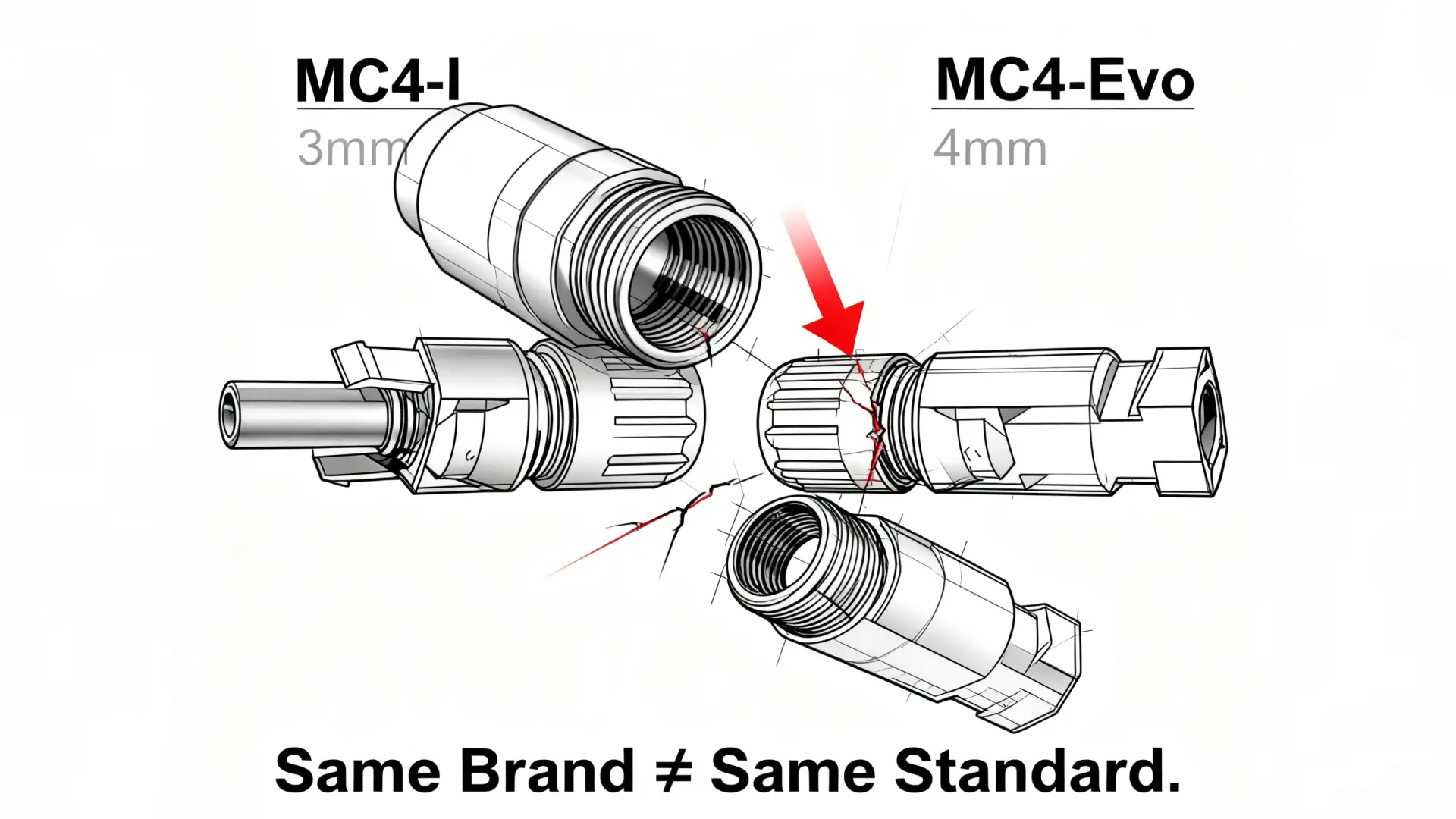
Understanding connector brand variations
Most tier-1 panels, like Trina, LONGi, and JinkoSolar, use genuine Stäubli MC4 connectors. Others might use “MC4-compatible” brands such as Amphenol, Phoenix Contact, or Multi-Contact clones. While they may physically fit, the internal metal contact tolerances differ.
| Solar Panel Brand | Connector Type Used | Fully Compatible with Genuine MC4? |
|---|---|---|
| Trina Solar | Stäubli MC4 | ✅ Yes |
| LONGi Solar | Stäubli MC4 | ✅ Yes |
| Canadian Solar | T4 or EVO2 | ⚠️ Only with adapters |
| JA Solar | MC4-compatible | ⚠️ Check brand before connecting |
| Unknown brands | Generic clones | ❌ Not recommended |
When I inspect customer installations, most “connection errors” come from mismatched MC4 pairs. Always check the brand and certification printed on the connector body.
What Happens if MC4 Connectors Don’t Match Your Solar Panel Ports?
Mismatching connectors may still “click,” but they won’t create proper contact pressure. This causes higher resistance and unstable power flow.
If MC4 connectors don’t match, they can loosen over time, overheat, or fail TÜV and IEC safety compliance3 — leading to system shutdown or fire risks.
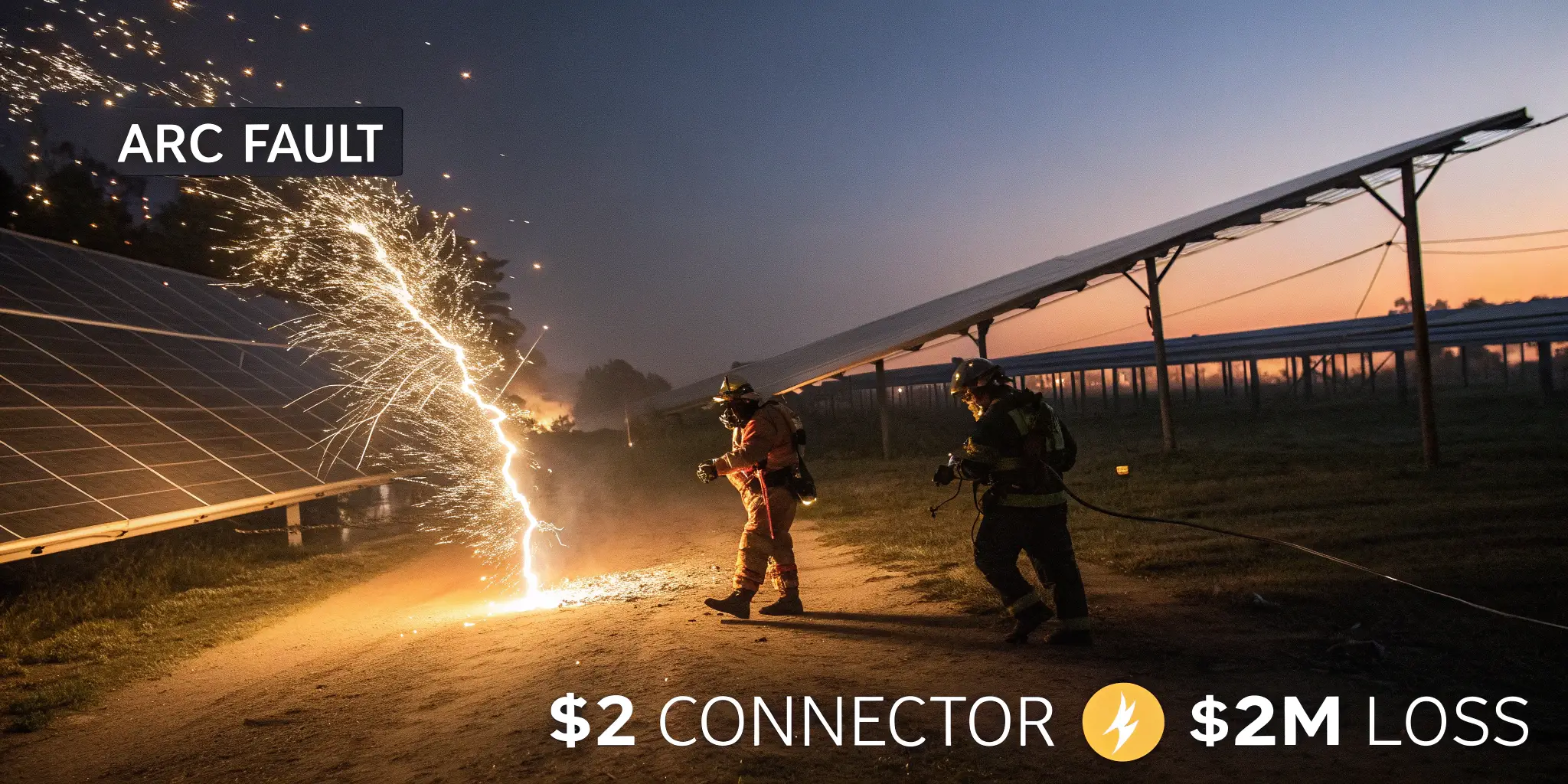
Inside an MC4 connector, metal contacts rely on Multilam contact springs4 to maintain constant pressure. Generic clones often use cheaper flat springs that wear down faster. Once contact weakens, the joint heats up — and heat leads to oxidation, melting, and arcing.
Common symptoms of mismatch:
- Hard to plug or unplug
- “Click” sound missing or weak
- Connector shell colors slightly different
- Hot spots detected during operation
It’s never worth the risk. Always use the same MC4 type throughout your PV system — or use certified adapter cables between different connector types.
Can MC4 Cables Connect to Non-MC4 or Generic PV Connectors?
Some older or low-cost panels come with non-MC45 connectors. Many users try to connect MC4 extension cables directly — but that’s not safe.
MC4 cables should not be directly connected to non-MC4 connectors. Use adapter cables certified for mixed connections instead.
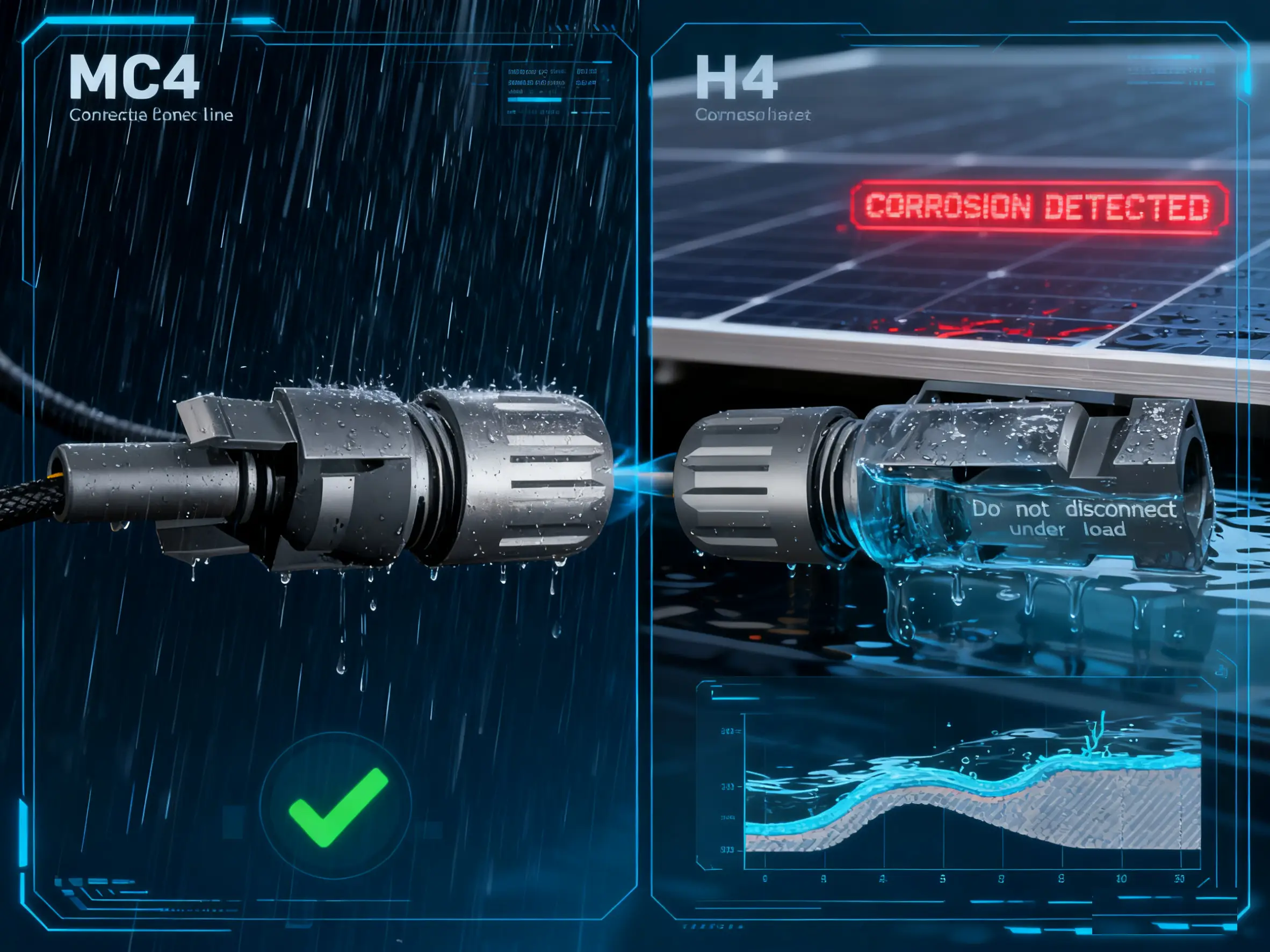
Mixing MC4 with other connectors: what goes wrong
Non-MC4 connectors, like Tyco, H4, or T4, often have different sealing diameters and locking mechanisms. Forcing them together can damage seals and compromise waterproof ratings (IP67). It may also break compliance with IEC 628526 or UL 6703 safety standards.
| Connector Type | Locking System | Compatible with MC4 | Requires Adapter |
|---|---|---|---|
| Stäubli MC4 | Snap-lock, 4mm pin | ✅ Fully | No |
| Amphenol H4 | Push-lock, 4mm pin | ⚠️ Partial | Yes |
| Tyco Solarlok | Screw-lock, 3.5mm pin | ❌ No | Yes |
| Multi-Contact (clone) | Snap-fit | ⚠️ Partial | Yes |
Adapters bridge differences in metal pin diameter and shell geometry — ensuring tight, safe connections without overheating.
How to Identify a Genuine Stäubli MC4 Connector (Corrected)
Genuine Stäubli MC4 connectors belong to the “Original MC4” product family, designed and manufactured by Stäubli Electrical Connectors in Switzerland. They are defined by their MULTILAM contact technology7, precision engineering, and long-term reliability — not by surface markings alone.
Real MC4 connectors can be recognized through the following verified characteristics:
- Equipped with MULTILAM contact technology, which ensures multiple contact points, low resistance, and stable electrical performance under high current.
- Certified according to IEC 62852, UL 6703, and TÜV Rheinland standards8, with approval numbers traceable in Stäubli’s official datasheet9s.
- Rated for up to 1500V DC10 depending on the model (MC4 or MC4-Evo 2), with IP65 / IP68 protection when mated and locked.
- Constructed using tin-plated copper contacts11 and UV-resistant, flame-retardant plastics (UL94 V-0) to guarantee safe operation in harsh outdoor conditions.
- Tested for ammonia and salt-mist resistance12, ensuring long-term stability even in coastal or agricultural installations.
Practical Ways to Verify Genuine MC4 Connectors
-
Purchase only from official or verified distribution channels.
Always buy from reputable distributors or directly through Stäubli’s authorized supply chain. Packaging integrity, correct part numbers, and traceable sourcing are key indicators of genuine products. -
Match the product code with the official datasheet.
Every genuine Stäubli connector corresponds to a specific part number. Check that the voltage rating, cable cross-section, and certification details align with the technical datasheet. -
Check for precision build quality.
Real Stäubli connectors have a consistent matte finish, tight-fitting components, and a smooth locking mechanism. The contact pins are solid and mechanically stable — never loose or roughly stamped. -
Verify certification and compliance documents.
Genuine connectors come with TÜV or UL certificates that match the part number. Always ask suppliers to provide these documents if you are buying in bulk or for certified projects. -
Avoid relying solely on external markings.
While many authentic connectors display “MC4” or “Stäubli” on the housing, counterfeit parts often copy these marks. The safest approach is verifying specifications, supplier reliability, and part numbers.
By following these steps, you can confidently identify original Stäubli MC4 connectors and avoid low-quality imitations that risk overheating, high resistance, or system failure in the long run.
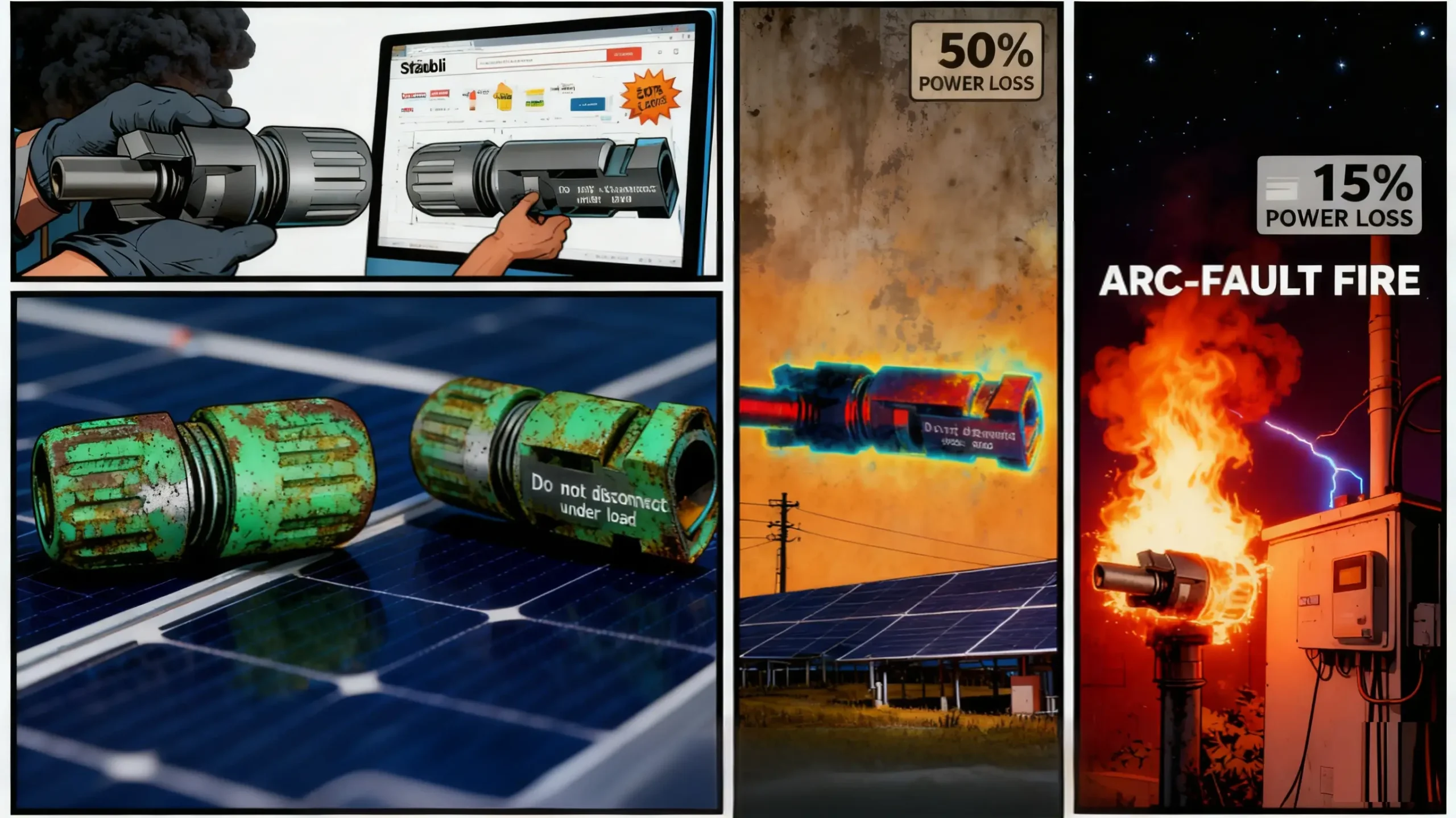
I once helped a client troubleshoot why their panels lost power after six months — the connectors were cheap fakes. After replacing them with real Stäubli MC4s, system efficiency recovered immediately.
Do MC4 Male/Female Ends Fit Every Extension Cable Type?
Not all male and female ends are created equal. Even small differences in pin length or diameter can cause partial contact.
MC4 male/female ends13 only fit safely with cables that match the same connector standard, conductor size, and insulation diameter.
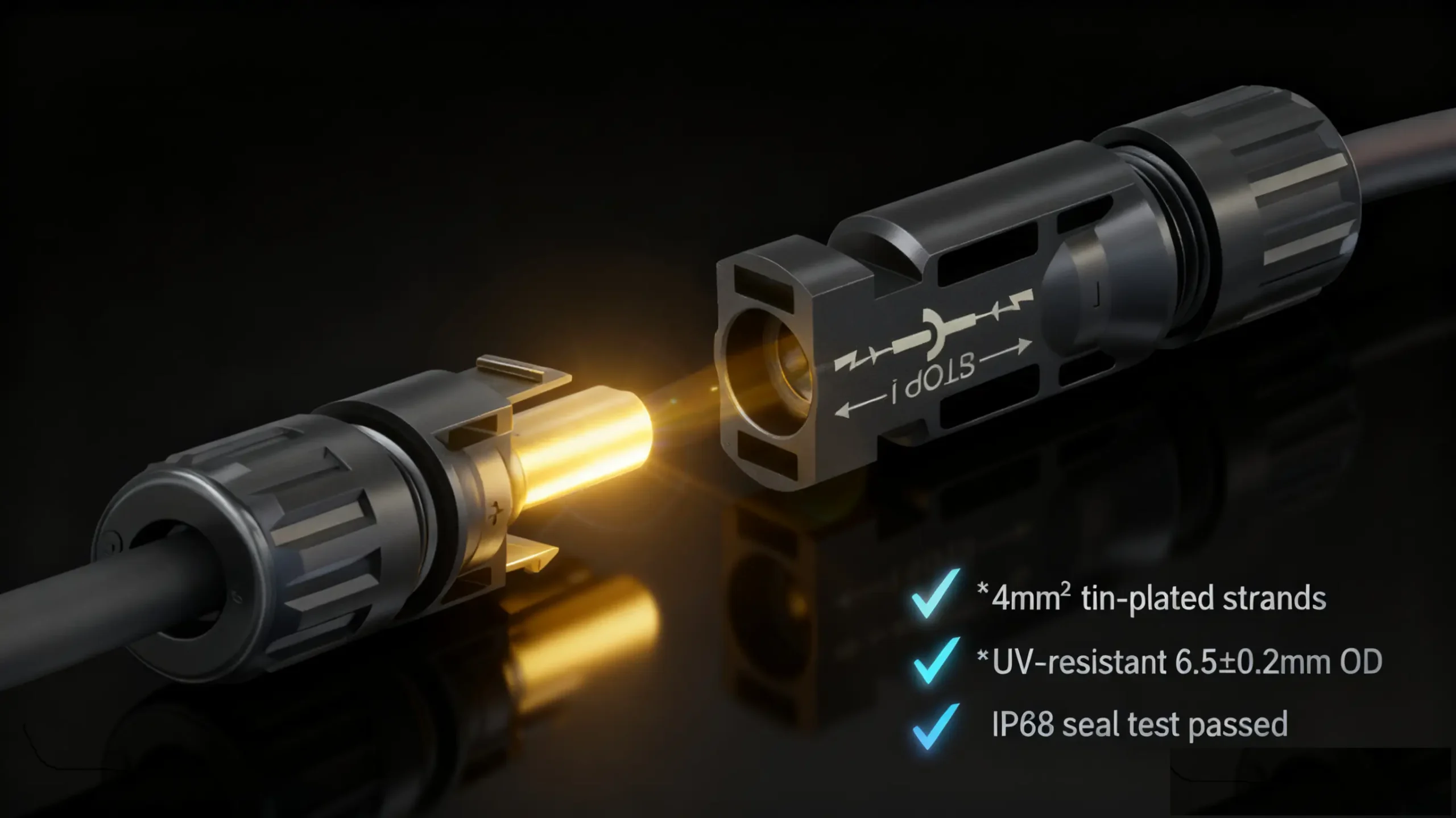
Getting the pairing right
Before connecting:
- Check if the cable is PV1-F or EN 50618 certified14 (solar-rated insulation).
- Verify the wire diameter (4mm², 6mm², or 10AWG).
- Match the connector model on both ends.
| Wire Size | Typical Use | MC4 Connector Type | Fit with Extension Cable |
|---|---|---|---|
| 4mm² (12AWG) | Small arrays | MC4 / MC4-Evo2 | ✅ Yes |
| 6mm² (10AWG) | Medium systems | MC4-Evo2 | ✅ Yes |
| 10mm² (8AWG) | Long runs | MC4 Industrial | ⚠️ Check fit |
| 2.5mm² (14AWG) | Portable kits | Generic clones | ❌ Not recommended |
Always test-fit connectors before field installation. Once locked, MC4 joints are waterproof and permanent — improper pairing could damage pins when disconnected.
Conclusion
Not every MC4 extension cable fits all solar panels. Compatibility depends on connector brand, certification, and fit precision. Always match genuine MC4 types, avoid generic clones, and use certified adapters for mixed connections to ensure safety and performance.
-
Explore this link to understand the functionality and compatibility of MC4 extension cables with solar panels. ↩
-
Learn about the significance of TÜV certification for MC4 connectors to ensure safety and reliability in solar installations. ↩
-
Exploring TÜV and IEC safety compliance helps ensure your solar system meets safety standards, reducing risks of failure. ↩
-
Understanding Multilam contact springs is crucial for ensuring reliable solar panel connections and preventing failures. ↩
-
Understanding the risks of non-MC4 connectors can help you make safer choices for your solar panel installations. ↩
-
Exploring IEC 62852 will provide insights into safety standards that ensure reliable and efficient solar energy systems. ↩
-
Understanding MULTILAM technology can help you appreciate its benefits in ensuring reliable electrical performance. ↩
-
Exploring these standards will provide insights into safety and quality assurance for electrical connectors. ↩
-
Learning to interpret datasheets ensures you select the right components for your electrical systems. ↩
-
Learn about voltage ratings to ensure your connectors meet the necessary electrical requirements for your projects. ↩
-
Discover the advantages of tin-plated copper in enhancing durability and performance in electrical connections. ↩
-
Understanding these resistances can help you choose connectors suitable for harsh environments. ↩
-
Understanding MC4 connectors is crucial for safe solar installations. Explore this link for detailed compatibility information. ↩
-
Learn about certification standards for solar cables to ensure safety and efficiency in your installations. ↩

